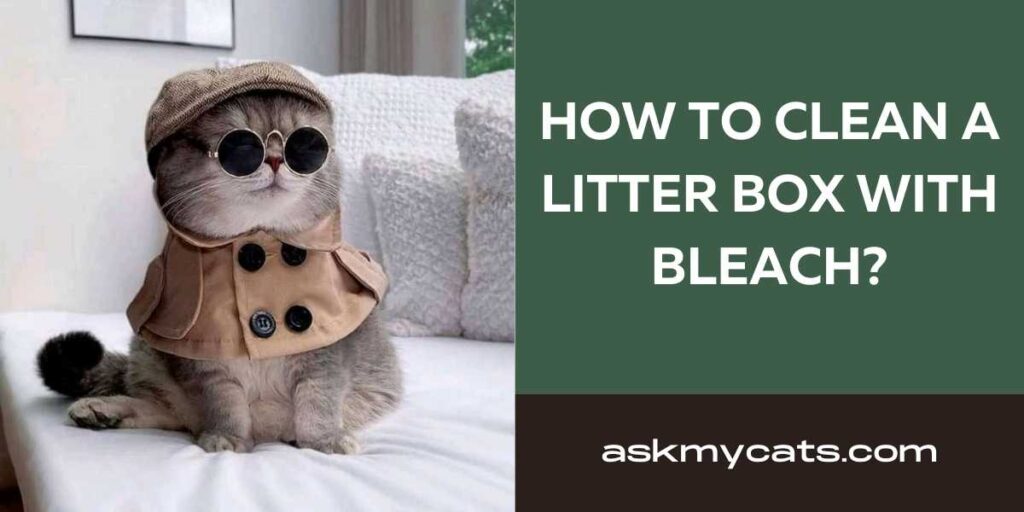A lot of cat parents are often looking for natural, non-toxic, environmentally friendly, and even cheaper and more reasonable alternatives for the commercially available chemical pet supplies in the market.
It can be the dry shampoo for their cat’s fur, the wet wipes for grooming their cats, and even cleaning agents for their cat’s litter box.
If you are one of those cat parents looking for an alternative to litter box cleaners, or if you are simply here out of curiosity – you have come to the right place.
In this article, we will be discussing how bleach can be a suitable option for you if you don’t want to spend a lot on those expensive litter box cleaning solutions available in the stores and markets.
Did you know that bleach is not the only easily available household item that can be used for cleaning your cat’s litter box? There are other items too, like vinegar and baking soda, that provide good alternatives.
However, in this article, we will be focusing in detail on the uses, advantages, and disadvantages of using bleach to clean your cat’s litter box. So, read along as a lot of your curious questions get answered.


Give Your Cat the Perfect Day
Get the Free Ebook!
Can You Use Bleach To Clean Your Cat’s Litter Box?

Yes, you can use bleach to clean your cat’s litter box, but you need to be alert about the quantity you use and ensure that you rinse the litter box thoroughly to not have any bleach residues.
It isn’t a hidden fact that one major downside of being a cat parent is the annoying bad stink that comes from the cat’s litter box.
As much as you hate the smell of the cat’s litter box, trust me when I say your cat hates it even more.
Cats have a keener and more sensitive sense of smell. They can even pick up on mild acidic or sour aromas.
That is why it is also advised that you should not use aromatic litter sand for your cat’s litter box.
One solution for this problem of stinky and unclean litter boxes is to use bleach to clean your cat’s litter box.
However, one thing to note here is that bleach is more of a disinfectant than a cleaning agent.
Isn’t the strong smell of bleach in the air a sign that something is exceptionally clean? No, not always. Bleach is useful for a variety of purposes, but cleaning is not one of them. Should you use bleach to clean your house, and can bleach provide additional benefits?
First and foremost, bleach is a disinfectant, not a cleanser. Bleach kills germs and viruses while also removing difficult stains and whitening garments.
However, bleach does not remove dirt and residue from surfaces on its own. To do so, first clean and rinse the surfaces before using a bleach solution.
Most of us smell bleach and assume it is being used to clean a surface, but it is most likely being used to disinfect the surface.
How Do You Clean A Cat Litter Box With Bleach?
The first and foremost step to do whenever you take up any litter box cleaning work is to gear up with thick gloves and a protective mask.
In case of cleaning with bleach, you might also want to wear some protective eyeglasses, because bleach can often cause fumes that can be pungent and harmful.

What Equipment Do You Need To Gather For Cleaning The Cat’s Litter Box With Bleach?
In order to get on with the cleaning process, you need to gather a couple of things:
- A scoop
- A pair of thick gloves
- A protective mask
- A pair of eyeglasses
- Bleach
- A big garbage bag
- A scrubber
What Are The Steps To Cleaning The Cat’s Litter Box With Bleach?
There are nine steps to follow for cleaning the cat’s litter box:
- Empty the used litter into a trash bag. Clean up any spills using a dustpan and brush.
- Scrape any dry litter from the box using your scooper.
- Spills should be swept into the bag. Before placing the bag in the garbage can, tie it tightly.
- Warm water and mild, unscented soap should be used to rinse the box. Make sure to clean both the interior and exterior of the box. It is not suggested to use bleach to the litter box straight quickly since there may be ammonia-containing pee residue.
- Use a clean sponge or towel to disinfect the litter box.
- Rinse the box well to ensure that all soap and bleach have been removed.
- Allow the box to dry. You may air dry it or wipe it dry with paper towels. Before adding fresh litter, make sure the litter box is totally dry. Wet litter will adhere to the box.
- This is an optional step. The litter box should be deodorized once it has been washed and dried. Before adding litter, put a teaspoon or two of baking soda over the box. Charcoal briquettes and filters are two more options for deodorizers.
- Refill the litter box and return it to its original location.
How Much Bleach Should You Put In Your Cat’s Litter Box?
Bleach can cause harmful fumes if used undiluted and poured directly into either the kitty litter or even the emptied litter box.
Never add more than 1 tablespoon of bleach with 1 pint of water.
Do not pour bleach straight into the litter box or any other container.
Rinse the box with water after removing the litter before adding the bleach and water. Scrub thoroughly, using a commode brush if necessary (marked just for that purpose). Rinse well and set it out to dry in the sun.
Does Bleach Deodorize Cat Litter?
No, bleach does not deodorize cat litter and you should not add it undiluted and directly into the kitty’s litter box.
However, if you do want to deodorize the kitty litter box, you can use baking soda. To absorb odor, sprinkle a thin coating of baking soda on the bottom of the litter box.
For a similar effect, you may buy baking soda-infused clay cat litter. To disguise any unpleasant odors, sprinkle a cat-specific deodorizer on top of the litter.
What Are The Advantages Of Using Bleach To Clean The Litter Box?

1. Inexpensive
Bleach is quite affordable when compared to other disinfectants or sanitizers. A gallon-sized container of bleach may be purchased for less than $5 on average in 2022. Other gallon-sized chemical disinfectants can cost more than twice as much.
When cleaning with bleach, a tiny amount of the product mixed with clean water is all that is required, which means that bleach products may last for a long time while still providing great disinfection.
2. Disinfectant
Bleach is a very strong disinfectant. It can sanitize and disinfect the litter box. Household chlorine bleach is a potent disinfectant (chemical cleanser that removes harmful bacteria) that is inexpensive, widely available, and effective in killing hazardous germs.
3. Mold and Allergen Remover
Bleach not only eliminates germs and viruses, but also kills and removes mold from wood, clothes, tile, and other surfaces.
What Are The Disadvantages Of Using Bleach To Clean The Litter Box?
There are certain dangers of working with bleach to clean the litter box.
Bleach is a powerful and efficient disinfectant. Its active component, sodium hypochlorite, denatures protein in microorganisms and thereby kills bacteria, fungi, and viruses.
Because household bleach works quickly and is readily accessible at a cheap cost, it is the most often used cleaning solution.
Bleach Should Not Mix With Cat Urine
The hazard of using bleach to clean a litter box is that it can combine with ammonia. If you’re wondering where the ammonia is coming from, it’s shocking that it’s from your cat.
Cat urine is made up of a variety of different chemicals. Urea, a nitrogenous waste that is significantly concentrated in cat pee, is one of these compounds.
When urea is broken down, it produces amines, which are ammonia-derived chemicals. This is why cat pee always has an ammonia-like odor.
Bleach Can Cause Release Of Fumes That Can Cause Health Hazards
Chloramine gas is produced when bleach is combined with ammonia. It’s a gas with a strong stench that might induce watery eyes, a runny nose, coughing, and chest tightness.
Bleach should also be used with caution. Bleach may irritate mucous membranes, the skin, and the airway, degrade when exposed to heat or light, and rapidly react with other chemicals. Improper bleach usage can also result in incidents that are hazardous to one’s health.
What Are The Substitutes Of Bleach For Cleaning A Cat’s Litter Box?
There are several substitutes for bleach for cleaning a cat’s litter box.
1. Vinegar
Vinegar is a very good acidic cleaner when it comes to thoroughly cleaning up a cat’s litter box. Vinegar is also easily available at reasonable rates.
2. Baking Soda
Baking soda is not only a good litter deodorizer but also it can be used as a good cleaning agent for the litter box.
3. Hydrogen Peroxide
Hydrogen peroxide mixed with equal parts of water forms a cleaning solution that not only cleans the cat’s litter box but also disinfects it. Hydrogen peroxide has antibacterial, antifungal, and antiviral properties too.
Frequently Asked Questions
What is the best thing to clean a litter box with?
The easiest technique to clean a litter box is to empty it completely and soak it in hot water for a few minutes once a week.
Can I clean the cat’s litter box with Clorox wipes?
Disinfectant wipes are deemed safe to use since they eliminate hazardous viruses and germs. To eliminate the residue left behind, you must rinse the litter box with water. Disinfectant wipes include chemicals that might be harmful to pets if they come into touch with them.
What happens when you mix cat urine and bleach?
Take Caution
Never use bleach to clean cat urine because cat pee includes a lot of ammonia, which when combined with chlorine bleach forms a poisonous gas that is extremely hazardous to humans and might even be fatal in high quantities.
Final Words
You undoubtedly despise the scent of your cat’s litter box, and your cat may despise it much more because its sense of smell is much keener than yours. This may cause your cat to seek an alternative and urinate on your carpet, furniture, or other undesirable spots.
Aside from the obvious causes, a filthy litter box can cause a variety of medical issues. These include Feline Lower Urine Tract Disease (FLUTD) and the potentially fatal urinary obstruction known as Feline Urethral Obstruction (FUO).
To avoid odors, scoop sediments and clumps of pee from the litter box on a regular basis. It is recommended that you clean the litter box thoroughly at least once every week.
